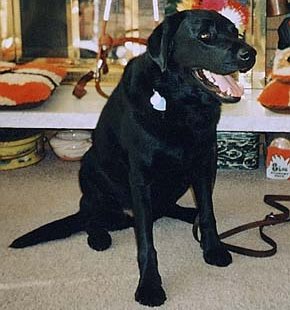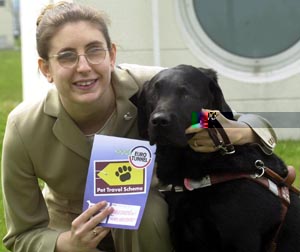
.
.
You'd be outraged if this happened to you. Eyeglasses, hearing aids, and crutches are vital mobility aids. No country in the world would pass a law that prevented you from bringing one of these items over its borders - you'd rightly call it discrimination against disabled people.
But...
Believe it or not, in Britain...
The British government claim that these draconian measures are necessary because Britain does not have rabies and admitting even one rabies-infected dog could bring the disease permanently to the island. Thus Britain maintains its quarantine requirement for all domestic animals, including guide dogs.
But...
Why do I care, you ask? Because when we emigrated to Britain, my wife and her guide dog, Largo, were separated for six months by this archaic law.

At first we couldn't believe that Largo would really have to leave us. "Surely there must be an exception!", we said - and so did many others, even a clerk at a quarantine kennel! But we came to understand that the British law is absolutely inflexible: no dog of any kind can enter Britain from the USA (or most other countries) without quarantine.
Quarantine cannot be an option for a guide dog, who would certainly lose his training after six months of total inactivity. Thankfully, there is a slightly less inadequate alternative: Largo could stay for six months in France, thus becoming a French dog and qualifying for no-quarantine entry to Britain. The wonderful people at Passports for Pets found Largo a family in France to live with, and we sadly parted from him in Toulouse.
Lisa now had to face not only a traumatic move to a new continent and a new culture, but also six months without Largo. A cane was a totally inadequate substitute - for instance, Lisa's cane will not pull her back from the path of an oncoming truck, as Largo has done many times. Lisa felt safe leaving our home without a human guide only a few times, and for short distances, during that six months - a terrible and inhumane limitation on her mobility.
Further, to keep Largo in training, Lisa had to regularly visit and work with him, so she flew to Toulouse several times during the separation period. Together with the kennel fee we paid to the family in Toulouse, the cost of a microchip, and various license and veterinary fees, this amounted to a huge cost - over 2000 British pounds (3000 US dollars).
Finally, on 9 May 2002, Largo met Lisa in Calais and returned via Eurotunnel, one of the few approved entry routes for dogs.

Largo now lives happily with us in Chester, England, but cannot accompany us on many trips, such as visits to our US families - so when she travels, Lisa must once again rely on a cane or a human guide.
Update 9 May 2003: A few routes to the US are now open for dogs to travel on - but the dog must travel in a sealed crate, which is harmful to a guide dog who is used to constant human companionship. Further, this means that the blind person must be without his or her dog for an extended period. Lisa and Largo refuse to travel this way because it is just too difficult for Largo. How would you like to be in a tiny sealed crate for 6-10 hours?!?
Please help us change this outrageous British policy. Here are some things you can do:

https://dsquirrel.tripod.com/largo/index5.html
Prime Minister Tony Blair,
10 Downing Street,
London, SW1A 2AA,
United Kingdom.
Email: Tony Blair's form-based email page
Department for Environment, Food and Rural Affairs [DEFRA],This is the government agency responsible for enforcing discrimination against guide dogs.
Area 201,
1a Page Street,
London,
SW1P 4PQ,
United Kingdom.
Tel: +44 (0)870 241 1710
Email: pets.helpline@defra.gsi.gov.uk
Margaret Beckett,Ms. Beckett is the minister responsible for DEFRA and thus bears ultimate responsibility for enforcing the British anti-guide-dog policy.
Secretary of State for the Department of Environment, Food and Rural Affairs,
Nobel House,
17, Smith Square,
London,
SW1P 3JR,
United Kingdom.
Email: parliamentary.secretary@defra.gsi.gov.uk
The Times of LondonBritain's leading broadsheet newspaper.
Email: letters@thetimes.co.uk
This noncommercial website contains graphics obtained free of charge from The Animation Factory.
Return to Squirrel's home page.